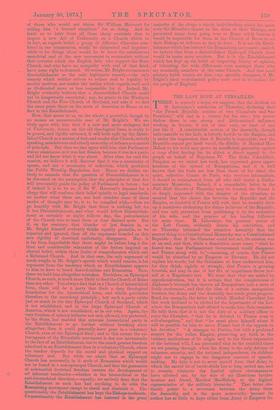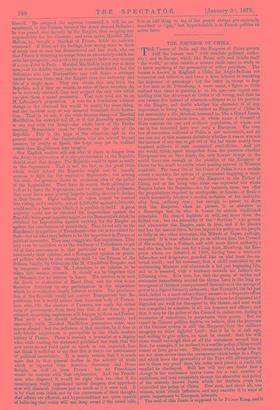THE LAST HOPE AT VERSAILLES.
THERE is scarcely a hope, we suppose, that the division on M. Laboulaye's resolution of Thursday, declaring that " the French Republic consists of two Chambers and tne
President," will end in a victory for his side ; but never- theless there is one strong and little-noticed influence working in favour, if not of that vote, at least of one just like it. A considerable section of the Assembly, though unfavourable to the Left, is bitterly hostile to the Empire, and is under the impression that if Royalty is impossible, and the Republic cannot get itself voted, the fidelity of Marshal Mac- Mahon to his word may prove an insufficient guarantee against a coup d'e'tat having for its object a direct appeal to the people on behalf of Napoleon IV. The Duke d'Audiffret- Pasquier, as we stated last week, has expressed grave appre- hensions of the spread of Bonapartism, and it is well known that his fears are less than those of his chief, the quiet, reflective Comte de Paris, who receives information, it should be remembered, from all who still desire a Parlia- mentary Monarchy. Indeed, if a remarkable letter in the Pall Mall Gazette of Thursday may be trusted, the Count is so deeply impressed with the dangers of the situation, so assured that the choice lies between the Republic and the Empire, so doubtful if France will wait, that he recently drew up a manifesto abdicating his claims in favour of the Republic, and was only prevented from publishing it by the entreaties of his wife, and the prayers of his leading followers for more time. M. Laboulaye, the greatest orator of the Left Centre, evidently shares his conviction, and on Thursday informed the attentive Assembly that the nearest thing to a Constitutional Monarchy was a Constitutional Republic ; that if the Chamber could not act, its mission was at an end, and that, while a dissolution must come, " what he feared was that Parliamentary Government would disappear, and France along with it,"—meaning, of course, that France would be absorbed by an Emperor or Dictator. He did not explain his words, but the Orleanists at least understood him, for they think, rightly or wrongly, that France is growing feverish, and may in one of her fits of impatience throw her- self at a Napoleon's feet. We trust that they are misled by apprehensiveness, but it is certain that the completeness of Alphonso's triumph has thrown all Bonapartists into a state of lively excitement, and that the idea of a certain antagonism between the Army and the Assembly has made great progress.
Read, for example, the letter in which Marshal Canrobert has this week declined to be elected for the department of the Lot, where the Bonapartists had offered to make him their nominee.
He tells them that it is not the duty of a military officer to enter the Chamber, " that he is devoted to France even to self-abnegation," and that " he must place himself where it will be possible for him to serve France best if she appeals to his devotion." " A stranger to Parties, but with a profound respect for the fallen Empire, preserving my faith in the tutelary institutions of its origin and in the direct expression of the national will, I am persuaded that in the troubled times we are passing through, when the Army is the only defence of calmness, security, and the national independence, its children ought not to engage in the dangerous contests of speech- making. My duty is not to sever myself from that Army to which the sacred tie of battle-fields has so long united me, and to remain, whatever the limited sphere circumstances have allotted me, by the side of my illustrious brother
in-arms and friend, Marshal MacMahon, as the highest representative of the military hierarchy." That letter dis- tinctly points to a severance between the Army from the Assembly, and is the more noteworthy because its author has so little to hope either from Army or. Emperor for
Ehnsell. He resigned the supreme command, it will be re- membered, in the Crimea, because the Army desired Pelissier ; he was passed over latterly by the Empire, thus escaping any responsibility for its disasters ; and even under Marshal Mac- Mahon, he, though a Marshal of France, holds no military command. If these are his feelings, how strong must be those of many men at once less disinterested and less weak, who see that France is wearying to escape from an uncertainty which im- pairs her prosperity, and makes the peasantry believe any rumour of a coup d'e'tat in Paris. Marshal MacMahon is not one of these men,—of his fidelity there can be no reasonable doubt ; but the Orleanists who fear Bonapartism may well desire a stronger barrier between them and the Empire than the authority and life of a single man. They can obtain this only from the Republic, and if they see reason, as some of them certainly do, to be seriously alarmed, they may support the only vote which can give them a moral guarantee. That vote need not be on M. Laboulaye's proposition. A vote for a dissolution without change in the electoral law would be nearly the same thing, and any incident may at any moment terminate their hesita- tion. That is to say, if the crisis became sharp—if Marshal MacMahon, for example fell ill, or if the Assembly quarrelled in any way with the Army—the whole force of the Parlia- mentary Monarchists must be thrown on the side of the Republic. This is the hope of the situation, and in the present temper of the Imperialists, who are stirred beyond measure by events in Spain, the hope may yet be realised sooner than Englishmen may imagine.
Our English readers will ask why, if there is danger from the Army or any section of it, the proclamation of the Republic should avert that danger. The Republic could be upset as easily as the Septennate. That is not the fact, as the great cities which would defend the Republic might not be equally anxious to fight for the repressive Septennate ; but setting this aside, the question shows an erroneous idea of the policy of the Imperialists. They have to secure their plebiscite as well as to upset the Septennate, and to secure their plebiscite they must have some general impulse leading electors to declare in their favour. Eight millions of voters cannot be coerced into voting, and a majority, say, of 2,500,000 against 1,500,000, would not be a base upon which it is possible to build. A great majority could not be obtained for Imperialism against the Republic, but a great majority might, as the Bonapartists think, be obtained for Imperialism against nothing, for the Empire as against the continuance of uncertainty. They do not rely on the Napoleonic sympathies of Frenchmen—the war is too recent for that—but on what they believe to be the impatience in France of political insecurity. They may exaggerate that impatience. They may even be mistaken as to the readiness of Frenchmen to get rid of their nervousness in that particular way. But that is notoriously their opinion, and a Bonapartist opinion on practi- cal politics which is also strongly held by the Princes of the Orleans family, by Orleanists like M. d'Audiffret Pasquier, and by temperate men like M. Laboulaye, is an opinion to be taken into serious account. It should not be forgotten that an Orleanist has no interest in hurry. His interest is to wait the death or abdication of Henri Cinq, and his view is not therefore disturbed by any participation in the impatience which he nevertheless clearly believes to exist. The proclama- tion of the Republic would not convert Bonapartists into Re- publicans, but it would relieve that immense body of French- men who, like the electors of Cazeaux, are ready for either form of government, from their fear that, if no form is pro- claimed, something unpleasant will happen to them and France. That such a fear should influence politics seriously, and especially while Marshal MacMahon guarantees order, may appear absurd; but the influence of that emotion, be it fear or only febrile impatience, is perceptible in the whole modern history of France. There is scarcely a journalist or a deputy who, while reading the statement published last week that the new taxes do not yield quite so much as was expected, does not think it sufficient to say that this is due to the continuance of political uncertainty. It is nearly certain that it is much more due to that general decline in the activity of trade which is reported from America, Germany, and Great Britain, as well as from France ; but no Frenchman would be content with that explanation. And the French- man who disputed it would be right thus far, that if his countrymen really apprehend unreal dangers, that apprehen- sion will diminish business just as much as if it were real. It is by what men think, not by the correctness of their thought, that affairs are affected, and hypochondriacs are quite capable of believing that water will not keep sweet if the vessel rolls.
It is an odd thing to say of the people always pre-eminently described as " gay," but hypochondria is in French politics an active force.



































 Previous page
Previous page